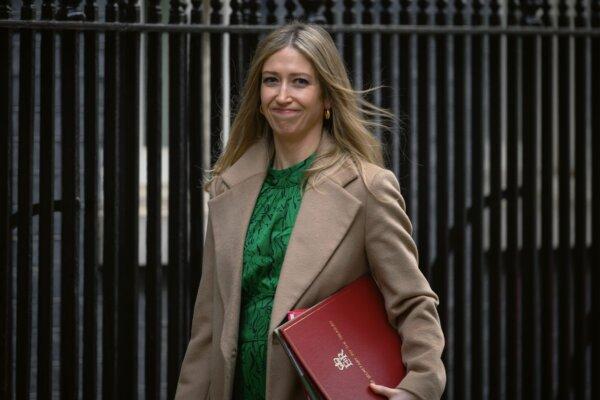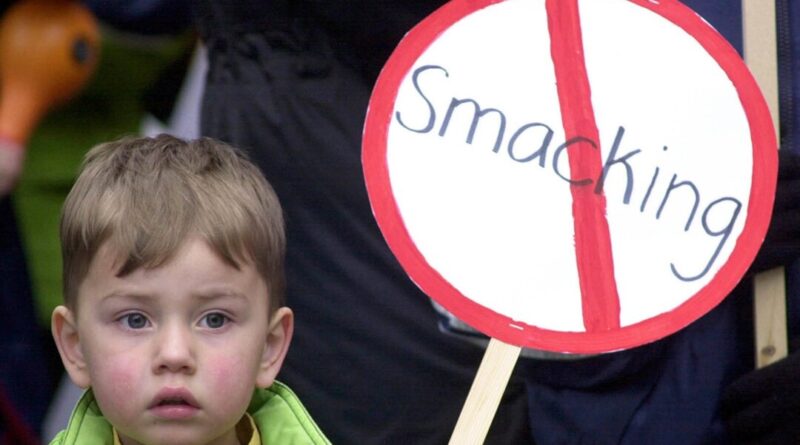Medical Professionals Urge Elimination of Corporal Punishment for Children
The government asserts that it is the prerogative of parents to determine how they discipline their children, while paediatricians are advocating for new legislation stipulating that corporal punishment is not permissible.
Paediatricians have appealed to the government to enact a fresh law clearly stating that the act of smacking children is not acceptable under any circumstances.
The devolved governments of Scotland and Wales have already passed such laws, but Westminster and Stormont have not followed suit, leading to potential legal ambiguities in England and Northern Ireland regarding what is deemed lawful, as noted by the Royal College of Paediatrics and Child Health (RCPCH).
A government minister has responded by asserting that the issue of how children are disciplined should not be subject to state interference; however, with a general election on the horizon, Labour might attempt to introduce such legislation.
Scotland made history by implementing a ban on smacking in November 2020, with Wales following suit in March 2022, outlawing all forms of corporal punishment. Sweden was the first nation globally to prohibit smacking in homes when it criminalized corporal punishment in 1979.
The RCPCH has called for revisions to the Children Act 2004 for England and the Law Reform Order 2006 for Northern Ireland to eliminate the “reasonable punishment” defense available to parents accused of physical abuse.
Their report on the subject asserts that now is the time for all political parties to make substantial commitments regarding this crucial children’s rights issue.
‘Unjust and Vague Laws’
Professor Andrew Rowland, a consultant paediatrician and RCPCH child protection officer, has stated that societal attitudes toward punishment have evolved over time, and most adults now concur that the physical punishment of children is unacceptable.
“The laws pertaining to physical punishment as they currently stand are unjust and dangerously vague,” he remarked.
“They create a gray area where certain forms of physical punishment may be lawful while others are not.”
He further added, “This lack of legislative clarity can even complicate matters when attempting to identify instances of child abuse.”
Physical punishment can also instill in a child the notion that violence is permissible, potentially leading to further instances of harm and violence later in life,” he emphasized.
Mr. Rowland stressed, “There should be no ambiguities when it comes to safeguarding children. Altering the laws in England and Northern Ireland will provide absolute clarity and ensure there are no circumstances where it is deemed acceptable or lawful to smack a child.”
A post by criminal defense law firm, BSB Solicitors, addressing the issue of smacking children mentions that common law has long acknowledged “reasonable chastisement” in terms of disciplining children.
“A parent or person in loco parentis may administer reasonable corporal punishment, although the concept of ‘reasonableness’ has become more stringent.”
In 2001, the Court deliberated on the issue of reasonableness and emphasized that standards evolve over time and common law is dynamic. For behavior to contravene the European Convention on Human Rights article 3 (which prohibits torture and degrading treatment), it must reach a specific level of severity, contingent upon the individual circumstances and the nature and context of the punishment.
English Parents Break Law if They Smack a Child in Wales
The divergent smacking laws enacted in Scotland and Wales represent the first departure in core criminal law between England and Northern Ireland.
English parents would be committing an offense if they were to smack their child in Wales or Scotland, although many may be unaware of this fact.
Joanna Barrett from the NSPCC remarked that children in England and Northern Ireland are still exposed to a legal loophole that can undermine their fundamental right to protection under the guise of ‘reasonable chastisement.’
She added, “As this timely report from child health experts at RCPCH indicates, physically striking a child can have detrimental and enduring consequences.”
“As highlighted by Childline, physical punishment can impact a child’s mental and emotional well-being and harm the parent-child relationship,” Barrett noted.
“This is why we are urging political leaders in England and Northern Ireland to commit to ending the physical punishment of children, as has successfully been done in the rest of the UK,” she concluded.

‘Motivated by Ideology’
Simon Calvert from the Be Reasonable Campaign contends that calls for legal reform “are driven by ideology rather than clinical evidence, and elected representatives should reject them.”
He elaborated, stating, “The current law vehemently prohibits all violence against children while shielding parents from prosecution for innocent and benign parenting decisions.”
“By definition, the reasonable chastisement defense is constrained to actions considered reasonable by the court,” he highlighted.
When asked by Sky News whether she supports efforts to outlaw smacking in England and Northern Ireland, treasury minister Laura Trott affirmed, “Our country already has stringent laws in place regarding child abuse.”
She emphasized, “These laws are clearly outlined in the Children Act, however, the responsibility for disciplining children lies with their parents.”
On the question of whether she agrees with paediatricians regarding the current laws’ vagueness, she responded, “It is unequivocally clear that any form of child abuse is unacceptable.”
She added, “We have been diligently working to ensure that all agencies involved with children are actively combating abuse and adhering to clear guidelines.”
A spokesperson for the Department for Education declared, “Any form of violence directed at a child is completely unacceptable, and we have robust laws in place to prevent it. It is the duty of parents to discipline their children appropriately and within legal boundaries.”
“We are providing support to educators, social workers, and all professionals involved in safeguarding to promptly detect signs of abuse or neglect, and our statutory framework for safeguarding children in England delineates the steps organizations should take to keep children safe,” the spokesperson continued.
A spokesperson for the Northern Ireland Department of Health stated, “Any decision to modify the legal position as outlined in the Law Reform (Miscellaneous Provisions) (Northern Ireland) Order 2006 will necessitate the consent of the Northern Ireland Executive.”
“The Department of Health continues to play a crucial role in assisting parents and caregivers of children and young people, particularly in promoting positive parenting behaviors,” they concluded.
PA Media contributed to this report.



